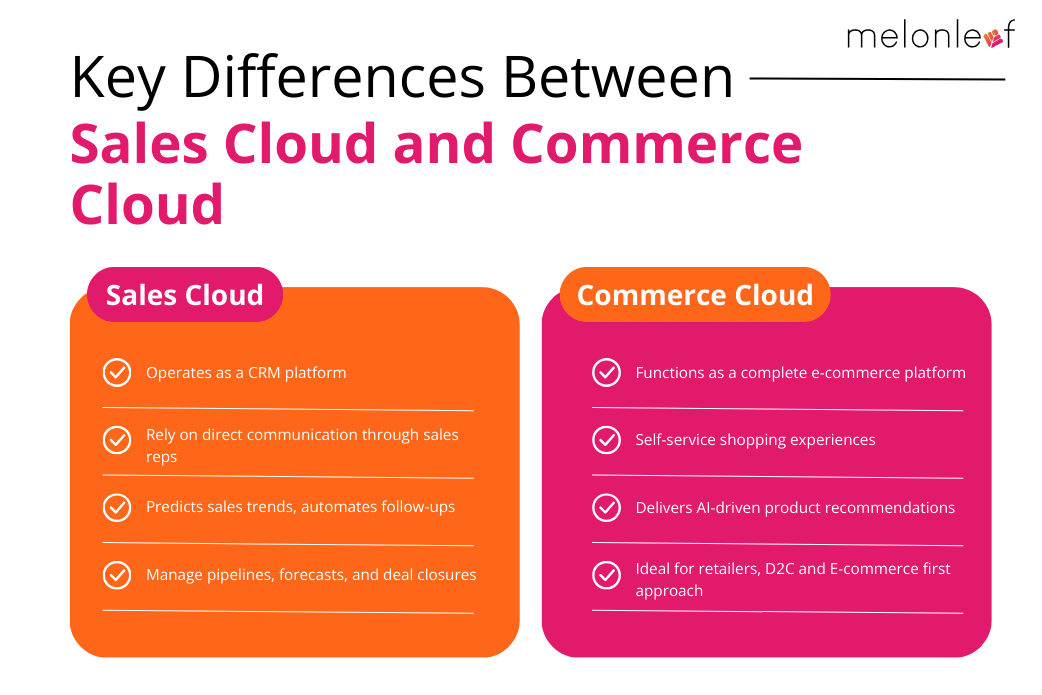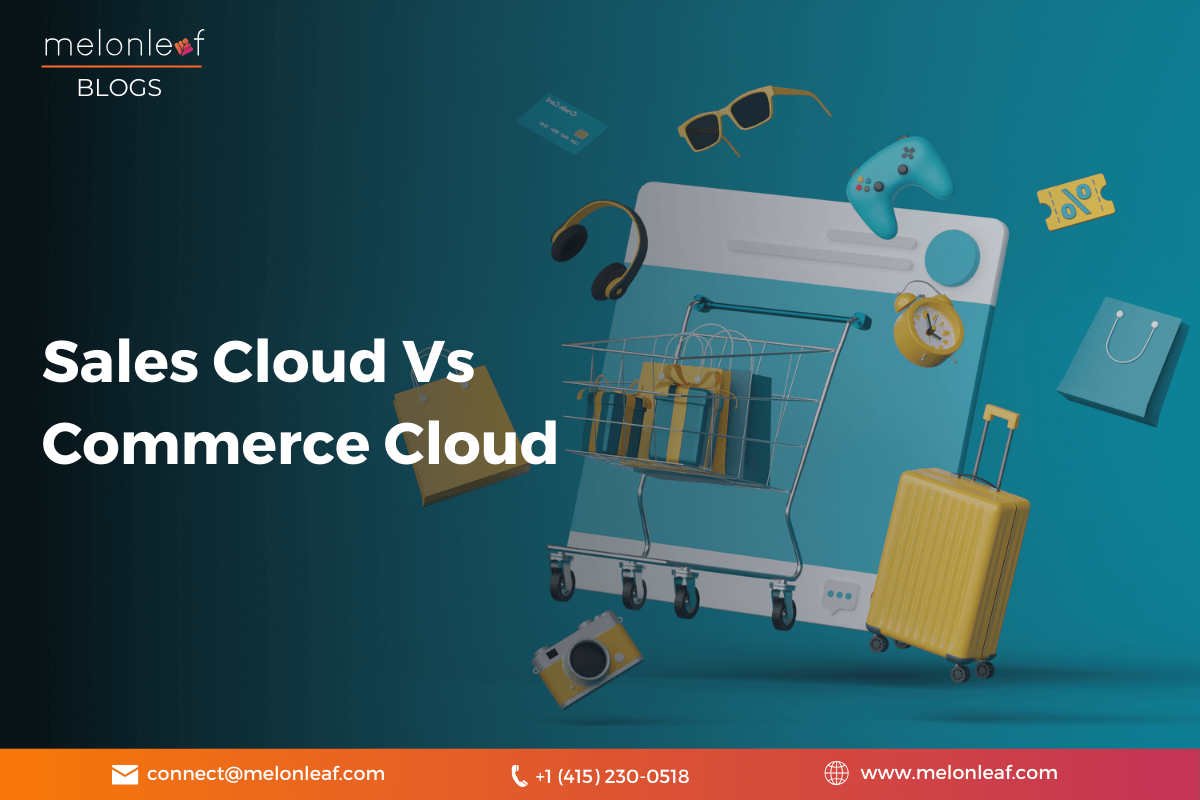A fast-growing business with ambitious sales goals and a bustling e-commerce store. The sales team is chasing leads, closing deals, and managing relationships, while the online store needs to keep up with ever-changing customer expectations. Salesforce offers two powerhouse solutions: Sales Cloud and Commerce Cloud.
But which one suits your business? Or do you need both? Let’s explore these two Salesforce clouds, their unique strengths, and how they fit into different business models.
Introduction to Salesforce Clouds
Salesforce stands as a guiding force for businesses, offering a suite of cloud-based solutions customized to various needs. Whether for handling sales, marketing, service, or e-commerce, there is a dedicated Salesforce cloud to refine the approach and create structured growth.
Among these, the Sales Cloud and Commerce Cloud are two prominent solutions, each serving a distinct purpose. Sales Cloud fuels sales teams with tools to manage leads, track deals, and build lasting customer relationships. Commerce Cloud, on the other hand, powers digital storefronts, offering businesses a robust platform to craft engaging online shopping experiences.
Apart from these two, Salesforce also provides:
Service Cloud: Built for customer support teams to track cases and improve service operations.
Marketing Cloud: Helps businesses craft personalized marketing campaigns across email, social, and digital platforms.
Experience Cloud: Aids in creating online portals and communities for better customer and partner engagement.
For businesses seeking clarity between Sales Cloud and Commerce Cloud, let’s explore them in depth and pinpoint the key differences.
Salesforce Sales Cloud: An Overview
What is Salesforce Sales Cloud?
Sales Cloud is a comprehensive customer relationship management (CRM) platform designed to support sales teams in tracking leads, managing opportunities, and closing deals more effectively. It provides a unified system where businesses can store customer information, monitor interactions, and refine sales strategies.
Features of Salesforce Sales Cloud
- Lead and Opportunity Management: Keep a structured pipeline of potential customers, track their journey, and improve conversions.
- Contact and Account Management: Maintain detailed records of customer interactions, ensuring a personalized approach to selling.
- Sales Forecasting: Analyze historical data to make informed predictions about future revenue.
- Process Automation: Reduce manual work by setting up automated workflows for repetitive sales tasks.
- Mobile Accessibility: Stay connected with customers and deals from anywhere, using the Salesforce mobile app.
- Reports and Dashboards: Gain deep insights into sales performance with visual reports and real-time analytics.
Who is Salesforce Sales Cloud for?
Sales Cloud is ideal for companies looking to refine their sales strategies, improve team efficiency, and track customer relationships with precision. From startups to enterprises, businesses across industries use it to build structured sales pipelines and improve deal closure rates.
If you want to read more about how Sales Cloud can refine your sales operations, check out our detailed Sales Cloud Guide.
Salesforce Commerce Cloud: An Overview
What is Salesforce Commerce Cloud?
Commerce Cloud is a cloud-based e-commerce solution that helps businesses create, manage, and scale online storefronts. It provides an integrated platform for businesses to sell across multiple channels, including web, mobile, social media, and physical stores.
If you want to explore how Commerce Cloud can help improve your e-commerce strategy, read our in-depth Salesforce Commerce Cloud Guide.
Features of Salesforce Commerce Cloud
- Multi-Channel Selling: Sell across various digital platforms while maintaining a unified shopping experience.
- AI-Powered Personalization: Utilize Einstein AI to suggest products and customize customer interactions.
- Order Management System (OMS): Handle everything from inventory tracking to fulfillment and delivery.
- Mobile Optimization: Offer a responsive and intuitive shopping experience across different devices.
- Scalability and Flexibility: Support business expansion with a platform that adapts to growing demands.
- Integration with Other Salesforce Products: Connects Commerce Cloud with Service Cloud, Marketing Cloud, and other Salesforce solutions.
Who is Salesforce Commerce Cloud for?
Commerce Cloud is designed for retailers and brands that want to build an engaging digital shopping experience. Whether you’re launching an online store or looking to expand your existing e-commerce presence, this platform provides the tools necessary to manage operations at scale.
Key Differences Between Sales Cloud and Commerce Cloud
Picking the right Salesforce solution depends on how a business interacts with its customers. Sales Cloud and Commerce Cloud may belong to the same ecosystem, but they serve entirely different purposes. While one focuses on managing relationships and guiding leads through a sales journey, the other revolves around digital commerce and online transactions.
Let’s break down the major differences between the two and help you decide which one fits your business needs best.

1. Business Function and Core Purpose
Sales Cloud operates as a customer relationship management (CRM) platform, built to track leads, manage opportunities, and improve sales team performance. Commerce Cloud, in contrast, functions as a complete e-commerce platform, handling online transactions, digital storefronts, and automated customer shopping experiences.
2. Customer Interaction Model
Businesses using Sales Cloud rely on direct communication through sales representatives, focusing on personal engagement to close deals. Commerce Cloud is designed for self-service shopping experiences, where customers browse products, place orders, and complete transactions independently.
3. Artificial Intelligence and Automation
Einstein AI works differently within each platform. Sales Cloud predicts sales trends, automates follow-ups, and improves lead scoring, helping sales teams prioritize prospects. Commerce Cloud delivers AI-driven product recommendations, personalized content, automated order fulfillment, enhancing online shopping journeys.
4. Sales Process vs. E-Commerce Transactions
For businesses relying on structured pipelines, Sales Cloud guides prospects through qualification stages, negotiations, and final deal closures. Commerce Cloud focuses on digital transactions, managing checkout experiences, payment processing, and post-purchase support for online buyers.
5. Integration with other Salesforce Platforms
Integrating Salesforce Clouds benefits from Marketing Cloud, Service Cloud, and Revenue Cloud, creating a connected ecosystem for customer interactions. Commerce Cloud connects with inventory management systems, payment gateways, and digital marketing tools, making it a go-to solution for online businesses looking to scale.
6. Industry Suitability and Business Models
Organizations with B2B and B2C sales teams find the Sales Cloud indispensable for managing pipelines, forecasts, and deal closures. Meanwhile, Commerce Cloud is ideal for retailers, direct-to-consumer brands, and businesses with an e-commerce-first approach, supporting digital growth.
7. User Experience and Customization
Different industries demand different tools. Sales Cloud provides custom workflows, pipeline tracking, and team collaboration features to boost sales efficiency. Commerce Cloud focuses on intuitive storefront designs, AI-powered merchandising, and mobile-optimized shopping experiences to attract and retain online customers.
8. Revenue Strategy and Growth Potential
Businesses using Sales Cloud drive revenue by nurturing leads, closing high-value deals, and strengthening client relationships over time. Businesses adopting Commerce Cloud generate revenue through higher cart conversions, optimized checkout processes, and personalized promotions that improve digital sales performance.
Choosing between these two Salesforce solutions depends on your business priorities. For businesses handling both traditional sales and e-commerce, using them together can create a well-rounded strategy that balances relationship-driven sales with digital revenue channels.
Sales Cloud vs Commerce Cloud: Which Salesforce Cloud should you choose?
The decision between a Sales Cloud and Commerce Cloud depends on the nature of your business.
- If your company relies on direct sales, lead nurturing, and account management, Sales Cloud is the right choice. It is particularly beneficial for B2B companies, professional service providers, and organizations that depend on relationship-based selling.
- If your business operates in online retail, selling products through digital channels, Commerce Cloud is the ideal solution. It is designed for e-commerce brands, online marketplaces, and businesses looking to scale their digital storefronts.
- If your organization has both a sales-driven and e-commerce model, integrating both platforms can provide a comprehensive business solution. Sales Cloud can manage direct customer interactions, while Commerce Cloud ensures a seamless digital shopping experience.
For businesses looking to implement either solution, partnering with an experienced Salesforce Consultant can help use the platform for business needs. Melonleaf Consulting provides expert guidance on Sales Cloud and Commerce Cloud implementation, helping businesses make the most of Salesforce’s capabilities.
Wrapping Up
The right Salesforce solution can shape the way a business connects with its customers. Sales Cloud gives sales teams the structure they need to build relationships and close deals, while Commerce Cloud powers digital storefronts, making online transactions smooth and efficient.
Both have their strengths, and the choice depends on whether a business thrives on direct customer interactions or automated e-commerce. For companies that need both, integrating them creates a well-rounded strategy that covers every touchpoint, from first contact to final purchase. And if you’re looking for expert guidance, Melonleaf Consulting is here to help you make the right choice.












